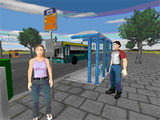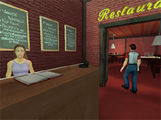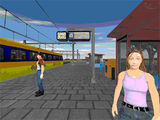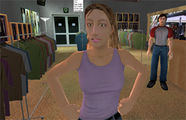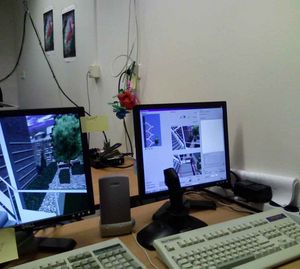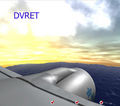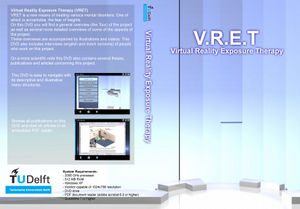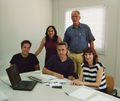Difference between revisions of "News"
Willem-paul (talk | contribs) |
|||
| Line 1: | Line 1: | ||
__TOC__ | __TOC__ | ||
| − | == In therapy with avatars == | + | == 2011 April 29 - Article Delfs Outlook - In therapy with avatars == |
| − | + | Overview [http://mmi.tudelft.nl/~willem-paul/WP_Papers_online_versie/delft_outlook.pdf article] of the VRET work done in Delft publiced in Delfts Outlook | |
| − | |||
| − | |||
| − | |||
| − | |||
| − | |||
| − | |||
| − | |||
| − | |||
| − | |||
| − | |||
| − | |||
| − | |||
| − | |||
| − | |||
| − | |||
| − | |||
| − | |||
| − | |||
| − | |||
| − | |||
| − | |||
| − | |||
| − | |||
| − | |||
| − | |||
| − | |||
| − | |||
== New members take part into VRET group == | == New members take part into VRET group == | ||
Revision as of 20:00, 9 May 2011
Contents
- 1 2011 April 29 - Article Delfs Outlook - In therapy with avatars
- 2 New members take part into VRET group
- 3 Matthew van den Steen graduated
- 4 Kunnen avatars mensen helpen?
- 5 Junior TU Delft working on VRET
- 6 VRET in Delta Universitity Journal
- 7 Christian Paping graduated
- 8 Research on PTSD
- 9 Appearance on Teleac TV program Helder (in Dutch)
- 10 Afscheidssymposium Charles van der Mast (in Dutch)
- 11 Virtueel van je angsten af (in Dutch)
- 12 Report on Presence and Anxiety
- 13 Fatma Inan and Ervin Sabadi graduated
- 14 First scientific field study on VRET results in a Dutch clinic
- 15 Interesting Blog about our project
- 16 New Video Tutorial available
- 17 Our project in QUEST
- 18 New poster about our VRET project
- 19 Junior TU Delft on VRET [continued]
- 20 Junior TU Delft on VRET
- 21 Lecture on the Delft VRET system
- 22 Master thesis by Siemen Roorda
- 23 Research Assignment by Ervin Sabadi
- 24 Delft VRET system in use at University of Amsterdam
- 25 Delft VRET system in use at VALK foundation
- 26 Xbox live and Second life
- 27 New world for fear of flying
- 28 AWARE Psychology
- 29 Bacinol Expo
- 30 VRET for hiking
- 31 Thesis on Augmented Reality
- 32 Survey on treating Hemiplegia
- 33 Workshop for GGZ Nederland
- 34 DVRET at Parnassia / PsyQ
- 35 DVD on our project
- 36 VRET and Serious Games!
- 37 New World for agoraphobia
- 38 Visit to Valencia
- 39 VRET transfered to PsyQ in the Hague
- 40 Technological challenges for VRET
- 41 Phobia treatment over the Internet!
- 42 Collaboration with Universidad Politecnica de Valencia
- 43 NATO Advanced Research Workshop
- 44 New Partners
- 45 New Partner Parnassia/PsyQ
- 46 Our project at NGC in the Netherlands
- 47 Parnassia/PsyQ visiting our project
- 48 Our project at IST 2004
- 49 SuperAssist
- 50 Our project at TV Quiz Hoe?Zo!
- 51 KLM pilots visiting our project
- 52 Our Project on National Geographic
- 53 Our therapy and system again on Dutch TV
- 54 Cooperation with the VALK Foundation
2011 April 29 - Article Delfs Outlook - In therapy with avatars
Overview article of the VRET work done in Delft publiced in Delfts Outlook
New members take part into VRET group
VRET group is growing up recently. More and more bachelors, masters and Ph.D students are gradually involved into virtual therapy projects:
Peter Pul, Neeti Hattangadi, Zakaria Meziane are involved in Project: VR bij de therapie van agressie management
Ni Kang is involved in Project: Social Phobia
Matthew van den Steen graduated
On April 28, 2010 Matthew van den Steen successfully defended his master thesis The Design and Evaluation of a Multi-Modal Memory Restructuring System for patients suffering from a combat-related PTSD. (pdf - 15 MB]
Kunnen avatars mensen helpen?
Slideszoals vertoond voor W&T Academie in Delft op 21 april 2010. (pdf - 4 MB, in Dutch)
Junior TU Delft working on VRET
For the third time Willem-Paul and Charles are giving a 5-day course in the Junior TU Delft program for the best high school students of the Netherlands. They develop this year new interactive worlds for treatment of social phobia. Our master student Daniel de Vliegher created an empty world and interaction framework for them. The students of this program will model there own objects to fill the world and create there own interactive dialogs.
VRET in Delta Universitity Journal
The Delta university journal published a small article on the success of our research. Presented is how our research is resulting in deployment in Dutch society. See here
Christian Paping graduated
On November 25, 2009 Christian Paping successfully defended his master thesis Multiple patient virtual reality exposure therapy. Previously his work was presented at the 2009 NATO Wounds of War conference.
Research on PTSD
In 2009 we started collaboration with Col Eric Vermetten MD, PhD on PTSD. Eric is Head of research of Military Mental Health Center / Utrecht Medical Center. Our master student Matthew van den Steen is working on a scenario-based study to develop a prototype for treating military employees suffering PTSD with experiences in Bosnia, Iraq, Afganistan, etc. First experiment with patients are planned for December 2009.
Appearance on Teleac TV program Helder (in Dutch)
On November 11, 2009 Willem-Paul and Guntur presented the VRET system in Dutch Teleac TV program Helder about fear. Host, Pernille la Lau, worn the head mounted display to see one of VR world designed to treat patients for their fear of heights. In the studio it was very nice also to see the patient view on the big screen wall. The audience could see what Pernille was experiencing while she was in the virtul world. The program will be broadcasted on 30 Nov 2009.
Afscheidssymposium Charles van der Mast (in Dutch)
On March 19, 2009 an "Afscheidssymposium" will be held on the occasion of the retirement of Charles. He will still be connected to the VRET-project, but other research and education will be minimized. On this link you find all details of the programme.
Virtueel van je angsten af (in Dutch)
Katharina Meyerbröker is interviewed for the ECHO website. Her goal is to get in contact with participants for her experiments on agoraphobia. Here is the link. Look and ask for an invitation.
Report on Presence and Anxiety
Liesbeth Kuiper (student Research Master Clinical Psychology from Leiden University) published a report on her internship at VALK foundation. The report is in Dutch (Stageverslag) but the core chapter Presence & Anxiety is in English. Look under Publications and scroll to Reports.
Fatma Inan and Ervin Sabadi graduated
Our master students Fatma and Ervin graduated in November 2008. The title of Fatma's thesis is: Virtual Reality and Social Phobia: Recreating a social situation in Virtual Reality. Ervin's thesis is entitled: Reaching a higher sense of presence in VR through 3D architectural visualization. See Own Publications>Reports.
First scientific field study on VRET results in a Dutch clinic
Wiersma, J, Greeven, A., Berretty, E., Krijn, M en Emmelkamp, P. (2008). De effectiviteit van Virtual Reality Exposure Therapy voor hoogtevrees in de klinische praktijk. Gedragstherapie, 41, p. 253-259. (in Dutch)-- Look under Publications on this site.
Summary in English. The effectiveness of Virtual Reality Exposure Therapy (VRET) for patients with acrophobia in clinical practice. The effectiveness of Virtual Reality Exposure Therapy (VRET) for patients with acrophobia has been shown in several academic settings. However, it is not clear if these results can be translated to the daily clinical practice. This article describes the effectiveness of VRET of acrophobia in a centre for anxiety disorders. Thirty-two patients participated in the study. At post-treatment there was a significant reduction of acrophobia and avoidance and participants gained significantly more self-efficacy and a more positive attitude towards heights. The effect sizes were high and comparable to those found in academic settings. It can be concluded that the effectiveness of VRET in academic settings can be translated to clinical practice. In short, VRET is a promising, and time-limited treatment for acrophobia. Key words: Virtual Reality Exposure Therapy, acrophobia, clinical practice
Interesting Blog about our project
Eliane Alhadeff published an interesting blog about our project. She made a very good op-to-date summary of current and future research on VRET in Delft. Here is the link.
New Video Tutorial available
Two Delft students produced a new video tutorial about the use of our DVRET system for fear of flying. The focus is to explain the operational procedures of the VRET software to non-technical therapists. First, a general description is given of the DVRET system. Then, the main functionality, which is exposed by the graphic user interface of the VRET software, be discussed in a short session. This is followed by a schematic description of all the operational tasks, such as takeoff and landing of the airplane, which could be performed with a therapeutic session. Lastly, a few of these tasks will be described in more detail. Two video's are part of of the tutorial. Text on screen is in English, all voice overs are in Dutch.
Our project in QUEST
In the Dutch popular science journal Quest an article is published on fear of flying. The title is "Ontspannen Op Reis". Issue of Quest 07/2008 pp. 52-55. The work of our partner VALK and our Delft VRET system is presented.
New poster about our VRET project
A new poster of our project and system is designed by Willem-Paul Brinkman. Our new focus on social phobia is presented. You can download it here. (pdf)
Junior TU Delft on VRET [continued]
The highschool students finished the course on VRET succesfully. Four worlds were developed for treating social phobia. They are evaluated with scenarios designed by the highschool students themselves! The worlds are: Platform on a train station, Bus stop, Clothing shop and Reception desk of a restaurant. Made with Maya and run in UnReal. With talking avatars. Here are impressions of the worlds. The implementation is done by Daniel de Vliegher.
Junior TU Delft on VRET
Delft University of Technology presents during March and April 2008 a course on VRET for high school students in Randstad. In 5 days the students (5-6 VWO) design a virtual world for treating fear for public speaking. The real implementation is done by our master students.
Lecture on the Delft VRET system
For the course Highly Interactive Systems of the master programme Media and Knowledge Enineering at Delft Charles van der Mast gave a lecture about the architecture and the development of the Delft VRET system. The lecture takes 45 minutes. The recording of voice and slides is here.
Master thesis by Siemen Roorda
Our master student Siemen Roorda finished his Thesis for the programme Media and Knowledge Engineering The title is: Develop[ing a general framework for the Delft VRET application. He re-implemented our system based on Vizard and the programming language Python. Look under Publications/Reports at this site.
Research Assignment by Ervin Sabadi
Our master student Ervin Sabadi finished his Research Assignment on VRET for agoraphobia from a home ententainment perspective. Look under Publications/Reports at this site.
Delft VRET system in use at University of Amsterdam
Paul Emmelkamp and his group is using the Delft VRET system now for new controlled experiments. Katharina Meyerbröker started her PhD project in September 2007. Recently a new HMD was delivered by Cybermind. Here you see one of the worlds for acrophobia.
Delft VRET system in use at VALK foundation
VALK foundation in Leiden is using the Delft VRET system now on a large scale with several therapists. An internal workshop is given this month. Here is how the system looks while being tested in a new room. All cables are invisible now!
Xbox live and Second life
This month we started a project to investigate the possibilities of Xbox Live and Second Life (and others) to function as a technical platform for phobia treatment.
New world for fear of flying
Burak Aslan finished his bachelor project to build a new VR-world for treating fear of flying. He developed a complete new cabin of a KLM Boeing 737-800 with high quality graphics. This virtual environment is far more realistic than the previous one we have. Also Schiphol airport is completely redesigned by Kenan Saracevic. Google Earth is used to show the view through the window during the flight. This is still a prototype we have to improve. Modelled with Maya and run with Quest-3D. You can find his report under Publications-section Reports. More information from Charles van der Mast, see Team.
AWARE Psychology
Our system is described in the new Dutch science magazine Aware Psychology. The title is Virtuele wereld IN/UIT.
Bacinol Expo
From June 6 - July 8 our VRET system will be present on an exhibition Virtual Realism. Several research projects are presented for a general public.
VRET for hiking
On March 15 two journalists of the popular Dutch Journal Op Pad (for adventures and hiking) visited our project. They are very interested in VRET for hikers suffering acrophobia in the mountains. The article is published in May 2007, Op Pad, Vol 4, pp. 70-73.[In Dutch: Een lichte trilling gaat door je lijf, je handen worden klam, je hartslag loopt op, je ademhaling versnelt, je pupillen worden groter, de haren in je nek staan overeind... HELP, see: http://www.oppad.nl]. Our system is used by PsyQ for treating acrophobia (hoogtevrees, zeer effectief! You may contact PsyQ).
Thesis on Augmented Reality
Marlon Richert finished his Thesis, too. Look under Publications, categrory Reports.
Survey on treating Hemiplegia
Marlon Richert finished his Research Assignment on treating hemiplegia. Look under Publications, categrory Reports.
Workshop for GGZ Nederland
On Wednesday October 4, 2006 we gave two workshops for the visitors of a GGZ Nederland conference in MediaPlaza/Utrecht. Charles van der Mast, Paul Emmelkamp and Martijn Schuemie gave a presentation for very interested therapists. Martijn discussed the demands from the clinics (therapists and managers) for applying VRET. To implement VRET in clinics a commercial version of the system is needed. Martijn will start to develop this in close collaboration with the research project. The fundamental research will be continued of course. Some pictures of the workshop are here.
DVRET at Parnassia / PsyQ
At Parnassia / PsyQ about 60 patients have been treated for acrophobia. In four sessions of 90 minutes each the treatment could be finished successfully. Drop-out rate was low. See here.
DVD on our project
Students from our bachelor program Media&Knowledge Engineering have produced an interesting DVD about our vrphobia project (in English). On the DVD you find an overview of the VRET system we made, some scientific results, many publications and some interviews of team members (in Dutch&English). Interested? Ask Charles van der Mast. You will get a copy.
Look here for screenshots (8MB pdf) of the DVD.
VRET and Serious Games!
On November 21, Charles van der Mast presented our project and system at a seminar of Media Plaza (Utrecht). This seminar was organized to bring together professional computer game producers under the label "Serious Games". VRET was presented as a great example of a serious game in which emotions are controlled more carefully and accurately than in commercial games. Interesting collaborations may emerge!
New World for agoraphobia
Frans Hooplot implemented the Markt in Delft as a new world for treatment of agoraphobia. A lot of parameters can be changed by the therapist. Three photo's are here.
Visit to Valencia
On July 21, Charles van der Mast visited the Universidad Politecnica de Valencia where he met our collegues Mariano Alcaniz, Carmen Juan, Jose Lozano and Sole Quero. And our Delft master student Dennis Joele. Here are two photo's with Mariano (left) and Charles (right).
VRET transfered to PsyQ in the Hague
Today, July 6, we transfered a dedicated VRET system to the headquarters of PsyQ (part of Parnassia) in the Hague. From this week on, PsyQ will treat patients with fear of heights and claustrophobia within virtual worlds. The transfer was without problems and we are expecting great results. PsyQ will remain an important partner in the future, too. For more information about PsyQ and the phobia treatments, take a look at PsyQ's website (in Dutch). This is the first time the VRET system is actually used in a clinic, rather than the research lab which was the case until now. If you are interested in a complete system in your clinic, please contact Charles van der Mast.
Technological challenges for VRET
The participation to the NATO Advanced Research Workshop generated a lot of value and interest for our project. We chaired a workgroup 2 and the slides we discussed with the participants plenarily are included here. The draft of our paper is here. [Mast, C. van der, Popovic, S., Lam, D., Castelnuovo, G., Kral, P. & Mihajlovic, Z. (2005). Technological challenges in the use of Virtual Reality Exposure Therapy, Proceedings of the NATO Advanced Research Workshop on Novel approaches to the diagnosis and treatment of posttraumatic stress disorder, Amsterdam IOS Press. (in press)] A book will be published later.
Phobia treatment over the Internet!
Today, June 1, we proved that our VRET-system can work over the internet. Our VRET-system is composed of two separate computers. The therapist computer can control the patient computer containing the virtual worlds completely. In this way the therapist can treat patients in other clinics or home. An intercom connection is needed for normal human communication between therapist and patient. The principle works. Now we have to prepare usability studies.
Collaboration with Universidad Politecnica de Valencia
Dennis Joele is a student from the master programme Media & Knowledge Engineering of Delft. He is doing his master thesis project at the Medical Image Computing Laboratory of the Universidad Politecnica de Valencia. His local supervisor is Dr. Maria Carmen Juan-Lizandra. From Delft he is supervised by Charles van der Mast. Dennis just finished his research assignment "Augmented Reality using ARToolkit with user invisable markers". He will continue his project at Valencia. This is the start of a collaboration on VRET.
NATO Advanced Research Workshop
Paul Emmelkamp and Charles van der Mast will participate in the NATO Advanced Research Workshop on Novel Approaches to the Diagnosis and Treatment of Posttraumatic Stress Disorder. June 13-15, 2005, Dubrovnik, Croatia. They will moderate workshops on Outcomes Measurement and Issues in Follow-up, and Technological Challenges in the Use of VR. We will report on the outcome.
New Partners
Two official partners are added to the list. Mentrum and CyberMind sent us a Letter of Intent to support a new research project on VRET we are preparing now. Mentrum is an organisation of about 1000 employees treating mental disorders in Amsterdam. They treat about 15,000 clients a year for mental disorders and a part of them for phobias. CyberMind is a leading provider of VR equipment in the EU. They deliver the hardware components of our VRET system to implement the virtual worlds. They develop head mounted devices and they resell products of other developers. They will contribute in developing a special version of a HMD suited for phobia treatment in the future.
New Partner Parnassia/PsyQ
Recently Parnassia sent us a Letter of Intent to participate in a new research project we are preparing right now. We will collaborate in developing new worlds and new treatment procedures. Parnassia will be involved in field studies. They will buy a copy of our VRET-system to train the therapists and to start VRET treatment with patients in their own clinics. Parnassia is a large organisation of about 3000 employees who provide instruction, treatment, coaching and nursing of people with psycho-medical problems or disorders. Parnassia is operating in about 30 clinics in the province of Zuid-Holland. About 40 phobia therapists are working for Parnassia.
Our project at NGC in the Netherlands
On Wednesday January 12, 2005 our project will be presented in the program Hot Sciences from Holland. Time 9 p.m. This video was produced almost two years agoo but the content is still very up-to-date in 2005! Click Phobia VR treatment movie for the movie in dutch (copyright NGC). This program is being broadcasted all over the world by NGC.
Parnassia/PsyQ visiting our project
On October 28, 2004 about 35 (!!!) phobia therapists from the health institute Parnassia in the Hague visited our project. Charles van der Mast and Paul Emmelkamp gave an overview of the project and the impressive results. Click here for some pictures.
Our project at IST 2004
Our project will be present at the European IST 2004 Event - Participate in your future. Participants will be there from all European countries. This year's edition of the most important European Information Society Technologies (IST) event is organised under the EU’s Dutch Presidency by the European Commission in partnership with the Dutch Ministry of Economic Affairs. The event will include a conference, an exhibition of research results and networking facilities for the about 4000 participants. The overall themes are "People" and "Economy". At the exhibition our system for fear of flying treatment is demonstrated. Look at This link for the website. Click here to view the movie. And Click here to view the pictures.
SuperAssist
The group MMI at Delft University got funds from IOP-MMI (in cooperation with other patners) for a research project SuperAssist on Personal assistants for distributed supervision of complex task environments, see abstract. The application domain is medical. Later VRET may be supported by results from SuperAssist.
Our project at TV Quiz Hoe?Zo!
Our project contributed to the interesting sience quiz Hoe?Zo! at Dutch TV on December 11, 2003. Rio and Charles were present. This is a screen of the explanation for our question: Does treatment of acrophobia help 20 % or 50 % or almost 100% of the patients? The last possibility is the right one.
KLM pilots visiting our project
On June 24, 2003 some pilots from KLM, therapists and the board of Stichting VALK visited our project at Delft. They are all involved in regular therapies for fear of flying. They experienced our vrphobia system personally in the role of patient as well as therapist. As experts they were impressed by the experiences using the newest version with more realistic features developed by Lucy Gunawan, including an enhanced user interface for the therapist. Click here to see some pictures.
Our Project on National Geographic
On January 31, 2003 a team of film makers visited our project in Amsterdam. They filmed the treatment of acrophobia with a real patient, including the intake interview and the interview after the treatment. They also recorded the virtual world for fear of flying treatment. The film will be broadcasted worldwide in the Autumn 2003. Click here to see the pictures.
Our therapy and system again on Dutch TV
The well known Dutch AVRO TV show "Vinger aan de pols" covered phobia treatment in November 2002. The presenter Pia Dijkstra discussed phobia treatment extensively with Prof. Paul Emmelkamp. Merel Krijn is shown treating (in the background of the discussion) an acrophobia patient using our system. You can see the entire show or scenes of the show (in Dutch) below in RealMedia. The codec used is RealVideo 9.
| Scene | Duration | 56K dial-up modem | 128K Dual ISDN | 256K DSL or Cable |
| Annemieke on her fear of heights | 31 sec. | 56 kbit/s | 128 kbit/s | 256 kbit/s |
| Prof. Emmelkamp on phobias, part 1 | 3 min. 29 | 56 kbit/s | 128 kbit/s | 256 kbit/s |
| Prof. Emmelkamp on phobias, part 2 | 16 sec. | 56 kbit/s | 128 kbit/s | 256 kbit/s |
| Prof. Emmelkamp on phobias, part 3 | 57 sec. | 56 kbit/s | 128 kbit/s | 256 kbit/s |
| VR-world for fear of heights, part 1 | 1 min. 57 | 56 kbit/s | 128 kbit/s | 256 kbit/s |
| Prof. Emmelkamp on VR-treatments | 3 min. 3 | 56 kbit/s | 128 kbit/s | 256 kbit/s |
| VR-world for fear of heights, part 2 | 2 min. 25 | 56 kbit/s | 128 kbit/s | 256 kbit/s |
| Prof. Emmelkamp on phobias, part 4 | 27 sec. | 56 kbit/s | 128 kbit/s | 256 kbit/s |
| Entire show | 34 min. 54 sec. | 56 kbit/s | 128 kbit/s | 256 kbit/s |
Cooperation with the VALK Foundation
We are very pleased to announce that we have a new partner: the VALK Foundation. This organisation is specialised in treatment of fear of flying and is connected to the University of Leiden. More news on our cooperation will follow.
